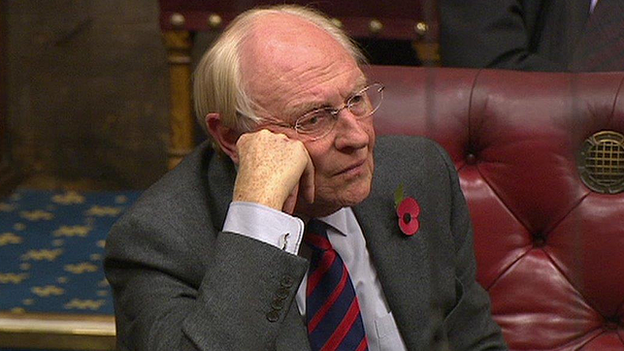Peers burn the midnight oil debating future of Wales
- Published
- comments

Lord Kinnock: 'There was and is no evident support among the public for the idea of income tax-raising or income tax-varying powers to be allocated to the Welsh Assembly'
What do members of the House of Lords get up to at eleven o'clock of an evening?
The answer, as you probably guessed, involves debating the Wales Bill, with Monday's committee stage ending at 11:12pm.
The Lords don't, by tradition, have votes during committee stages. Instead, amendments are introduced, moved and debated before being withdrawn after peers have had the chance to find out if ministers might change their mind later during the legislative process - or whether there is such a groundswell of support to change the Bill that the government might be defeated.
Peers spent an hour of that time debating whether a referendum should be held before the Welsh Government gets the power to vary income tax rates.
The law, as it now stands, says there should be a plebiscite but the Wales Bill scraps that requirement, much to the annoyance of Welsh Labour grandees Lords Hain, Murphy and Kinnock.
'Referendums'
The debate, perhaps inevitably, featured reflections, prompted by recent experience, on the recent nature of referendums. Lord Kinnock spoke of his own bruises and scars from the Brexit vote, but argued referendums were justifiable in a parliamentary democracy "when there is a proposal to change the way in which we are governed".
He argued that the proposal to give Wales tax-varying powers was made "in the absolutely certain and cynical knowledge that it would not be exercised" and that there "was and is no evident support among the public for the idea of income tax-raising or income tax-varying powers to be allocated to the Welsh Assembly".
Wales Office Minister Lord Bourne disagreed, telling peers: "I strongly and sincerely believe that if we were to have a referendum, it would be carried".
Former Labour MP Lord Howarth of Newport, suggested the Conservatives were "sliding away" from a clear manifesto commitment to only devolve tax powers after a referendum.
'Accountability'
The Welsh Conservative manifesto, external referred to the issue in a passage on what politicians call "fair funding". It said: "We will do this by putting in place a floor in the level of relative Welsh Government funding in the expectation that the Welsh Government will hold a referendum on income tax raising powers.
"We will bring greater financial accountability to the Welsh Assembly by ensuring that the Welsh Government becomes responsible for raising more of the money it spends."
Whether the UK government is sliding away from that or not, Labour and Liberal Democrat frontbenchers support the scrapping of a referendum requirement and this part of the Bill looks unlikely to change.
Their lordships moved on (eventually) to discuss the list of powers to be kept at Westminster. Lord Bourne politely agreed to look at them.
'Falklands'
Former Plaid Cymru leader Lord Wigley tabled an amendment designed to ensure the Welsh Government can continue to support the Welsh language and culture in Patagonia.
Labour peer (and historian) Lord Morgan reflected that "the Welsh community in Chubut rather benefited from the Falklands War because the Argentine government were rather anxious to show that they were solicitous of the needs of cultural minorities in their country".
Lord Bourne said the Wales Bill would already allow the Welsh Government to continue its support.
You can read part one of the debate here, external and part two here, external. Peers return to the subject on Wednesday, November 16.